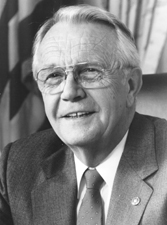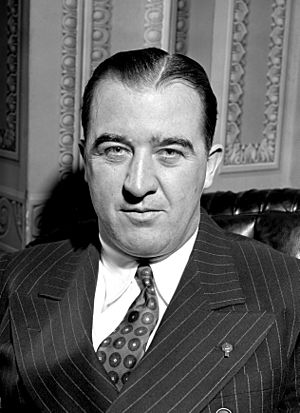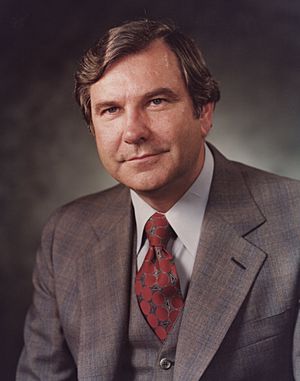Wendell Ford facts for kids
Quick facts for kids
Wendell Ford
|
|
|---|---|
 |
|
| Senate Minority Whip | |
| In office January 3, 1995 – January 3, 1999 |
|
| Leader | Tom Daschle |
| Preceded by | Alan Simpson |
| Succeeded by | Harry Reid |
| Senate Majority Whip | |
| In office January 3, 1991 – January 3, 1995 |
|
| Leader | George J. Mitchell |
| Preceded by | Alan Cranston |
| Succeeded by | Trent Lott |
| United States Senator from Kentucky |
|
| In office December 28, 1974 – January 3, 1999 |
|
| Preceded by | Marlow Cook |
| Succeeded by | Jim Bunning |
| 53rd Governor of Kentucky | |
| In office December 7, 1971 – December 28, 1974 |
|
| Lieutenant | Julian Carroll |
| Preceded by | Louie Nunn |
| Succeeded by | Julian Carroll |
| 45th Lieutenant Governor of Kentucky | |
| In office December 12, 1967 – December 7, 1971 |
|
| Governor | Louie Nunn |
| Preceded by | Harry Lee Waterfield |
| Succeeded by | Julian Carroll |
| Member of the Kentucky Senate from the 8th district |
|
| In office 1966 – December 12, 1967 |
|
| Preceded by | Casper Gardner |
| Succeeded by | Delbert S. Murphy |
| Personal details | |
| Born |
Wendell Hampton Ford
September 8, 1924 Owensboro, Kentucky, U.S. |
| Died | January 22, 2015 (aged 90) Owensboro, Kentucky, U.S. |
| Resting place | Rosehill Elmwood Cemetery |
| Political party | Democratic |
| Spouse |
Jean Neel
(m. 1943) |
| Alma mater |
|
| Military service | |
| Allegiance | |
| Branch/service | |
| Years of service | 1944–1946, 1949–1962 |
| Rank |
|
| Unit | Kentucky Army National Guard |
| Battles/wars | World War II |
| Awards |
|
Wendell Hampton Ford (born September 8, 1924 – died January 22, 2015) was an American politician from Kentucky. He served for 24 years in the U.S. Senate. He was also the 53rd Governor of Kentucky.
Ford was the first person in Kentucky history to be elected lieutenant governor, then governor, and then a U.S. Senator. He was a key leader of Kentucky's Democratic Party. This was from when he became governor in 1971 until he left the Senate in 1999. He was the Senate Democratic whip from 1991 to 1999.
When he retired, he was the longest-serving senator in Kentucky's history. Later, Mitch McConnell served longer. Ford was the most recent Democrat to be a Senator from Kentucky.
Born in Daviess County, Kentucky, Ford went to the University of Kentucky. He paused his studies to serve in World War II. After the war, he finished school and joined his family's insurance business. He also continued his military service in the Kentucky Army National Guard.
Ford became involved in politics. He worked for Governor Bert T. Combs and later won a seat in the Kentucky Senate. In 1967, he became lieutenant governor. Four years later, he was elected governor of Kentucky.
As governor, Ford made the government work better. He changed how some departments were organized. He also raised money for the state through a tax on coal. He made improvements to the education system. In 1974, he was elected to the U.S. Senate.
As a senator, Ford strongly supported Kentucky's tobacco industry. He also created the Senate National Guard Caucus. This group worked to help the National Guard. He retired from the Senate in 1999. After retiring, he taught politics to young people in Owensboro.
Contents
Early Life and Military Service
Wendell Ford was born near Owensboro, Kentucky, in Daviess County, Kentucky. His birthday was September 8, 1924. His parents were Ernest M. and Irene Woolfork Ford. His father was a state senator.
Ford went to public schools in Daviess County. He graduated from Daviess County High School. From 1942 to 1943, he studied at the University of Kentucky.
On September 18, 1943, Ford married Jean Neel. They had two children: Shirley (born 1950) and Steven (born 1954). The family went to First Baptist Church in Owensboro.
In 1944, Ford left college to join the Army. He served in World War II. He became a technical sergeant. He earned several awards, including the American Campaign Medal and the World War II Victory Medal. He was honorably discharged in 1946.
After the war, Ford worked with his father in their insurance business. He also joined the Kentucky Army National Guard in 1949. He became a Second Lieutenant and later a First Lieutenant. He was discharged from the Guard in 1962.
Starting a Political Career
Ford was very active in his community. In 1954, he became the first Kentuckian to lead the Jaycees. He helped with Bert T. Combs' campaign for governor in 1959. After Combs won, Ford worked as his assistant from 1959 to 1963.
In 1965, Governor Ned Breathitt asked Ford to run for the state senate. Ford won the election by a small number of votes. He quickly became an important person in the state senate. During his time there, he helped pass 22 new laws.
In 1967, Ford decided to run for lieutenant governor. He won the Democratic primary election. Then, he won the general election. This was unusual because the Republican, Louie B. Nunn, won the governor's race that year.
As lieutenant governor, Ford helped strengthen the Democratic Party in Kentucky. This helped other Democrats win elections later on. He opposed a plan to raise the state sales tax unless food and medicine were not taxed. However, the tax increase passed without these exemptions.
Becoming Governor of Kentucky
In 1971, Ford ran for governor. There were eight candidates in the Democratic primary. His former mentor, Bert Combs, was also running. Ford won the primary election, which was a big surprise.

Ford then won the general election for governor. He beat Republican Tom Emberton and former governor Happy Chandler, who ran as an independent. With Combs and Chandler out of politics, the Democratic Party in Kentucky became more unified.
As governor, Ford raised money for the state. He did this with a tax on coal and gasoline. He also increased taxes on businesses. To balance this, he removed the state sales tax on food. These changes helped the state have a large budget surplus.
Ford used state money to build the Commonwealth Convention Center. He also expanded the Kentucky Exposition Center. He worked to improve the state's criminal justice system.
He helped the University of Louisville get state funding. He also made changes to the state's education system. He gave more power to the Council on Postsecondary Education. This helped make college administration more professional.
Ford worked to make government departments more efficient. He grouped many departments into "super cabinets." This helped save money for the state.
In 1972, the U.S. Supreme Court changed voting rules. Ford called a special meeting of the state legislature. They updated Kentucky's voting laws to match the new federal rules. They also created a state environmental protection agency.
Ford attended the 1972 Democratic National Convention. He became involved in national politics. He was elected chairman of the Democratic Governors' Conference from 1973 to 1974.

Ford's leadership helped the Democratic Party in Kentucky. In 1972, Walter Dee Huddleston, Ford's campaign manager, won a U.S. Senate seat. This was the first time a Democrat won that seat since 1956.
Ford's friends encouraged him to run for the other U.S. Senate seat. This seat was held by Republican Marlow Cook. Ford decided to run after a poll showed he was the only Democrat who could beat Cook.
In the 1974 election, Ford defeated Cook. Cook resigned his seat early so Ford could start in the Senate sooner. Ford then resigned as governor. Julian Carroll became the new governor.
Serving in the United States Senate
Ford became a U.S. Senator in 1974. He was reelected in 1980, 1986, and 1992. He faced little opposition in these elections. In 1980, he won with 65 percent of the votes. In 1986, he won with 74 percent of the votes, a record for Kentucky.
Ford thought about running for governor again in 1983 and 1991. However, he decided to stay in the Senate. He wanted to use his experience there to help Kentucky. He also wanted to become the Democratic Senate whip.
From 1977 to 1979, Ford chaired the Committee on Aeronautical and Space Sciences. He also served on the Democratic Senatorial Campaign Committee.
Ford became the Democratic whip in 1991. This is a leadership role in the Senate. He later supported Christopher Dodd for majority leader.
In 1989, Ford and Senator Kit Bond created the Senate National Guard Caucus. This group worked to improve the National Guard. In 1998, the Wendell H. Ford Training Center was named in his honor. In 1999, he received the Sonny Montgomery Award, a high honor from the National Guard Bureau.
Ford and Senator Dee Huddleston were strong supporters of tobacco. Tobacco was a very important crop in Kentucky. Ford worked to protect the tobacco industry. He helped keep tobacco from being included in some safety laws. He also opposed increases in cigarette taxes.
As chairman of the Commerce Committee's aviation subcommittee, Ford helped get money to improve airports in Kentucky. The Wendell H. Ford Airport in Hazard, Kentucky is named after him. A law to reduce aircraft noise and improve airline safety was also named after him.
Ford focused on issues important to Kentucky. He sponsored an amendment to the Family Medical Leave Act. He also helped pass the motor voter law in 1993. He supported increases to the federal minimum wage.
Ford also worked to make the government more efficient. He saved millions of dollars in printing costs. He did this by printing in large amounts and using recycled paper.
Later Life and Legacy
Ford decided not to run for a fifth term in 1998. He retired and moved back to Owensboro. He worked as a consultant for a law firm. When he retired, he was the longest-serving senator in Kentucky's history.
In 1978, a bypass around Owensboro was named the Wendell H. Ford Expressway. The Western Kentucky Parkway was also renamed the Wendell H. Ford Western Kentucky Parkway. In 2009, Ford was recognized in the Kentucky Transportation Hall of Fame.
Later in life, Ford taught politics to young people. He did this at the Owensboro Museum of Science and History. The museum has a copy of his Senate office.
Wendell Ford died at his home on January 22, 2015. He was 90 years old. He was buried at Rosehill Elmwood Cemetery.
See also
 In Spanish: Wendell Ford para niños
In Spanish: Wendell Ford para niños
 | Calvin Brent |
 | Walter T. Bailey |
 | Martha Cassell Thompson |
 | Alberta Jeannette Cassell |


